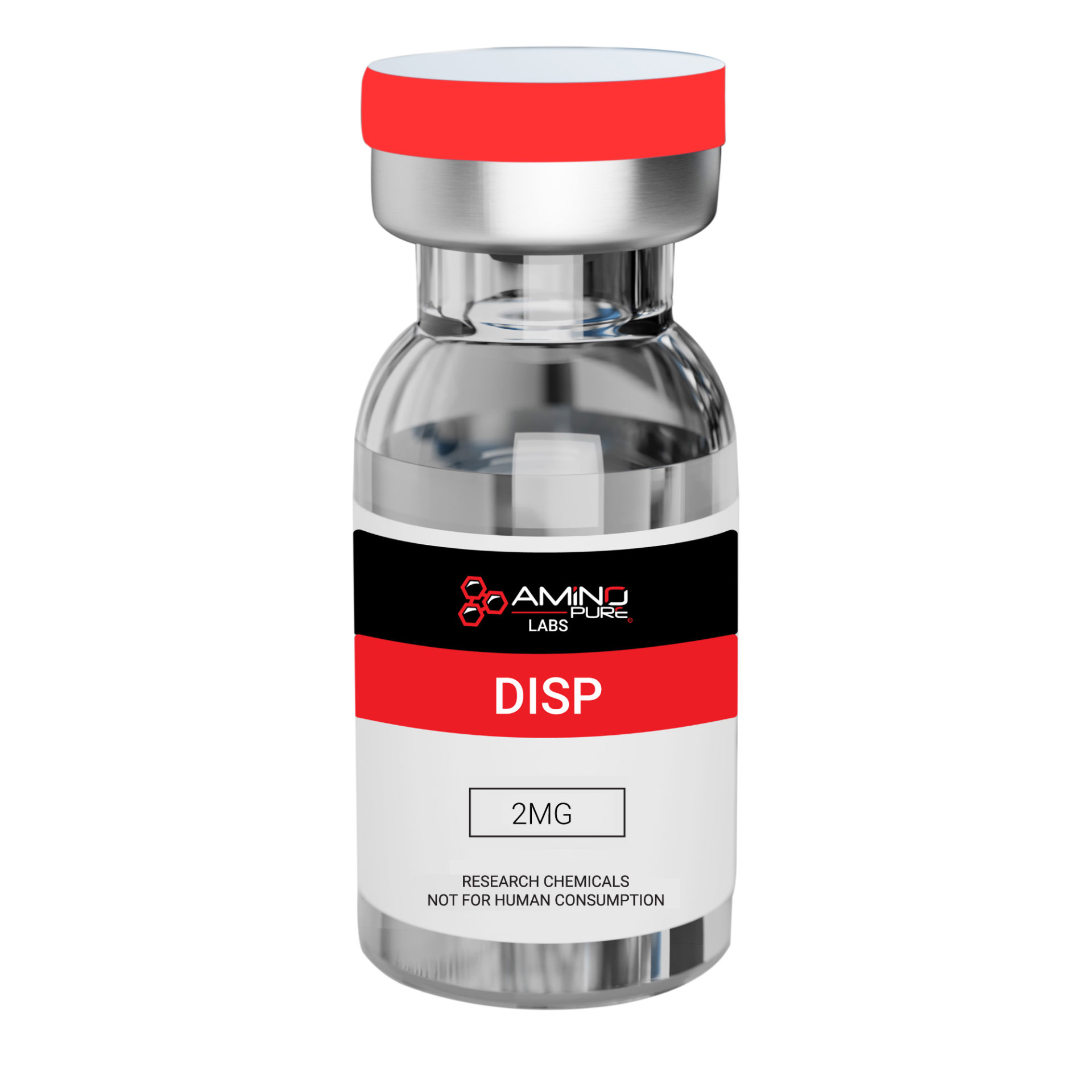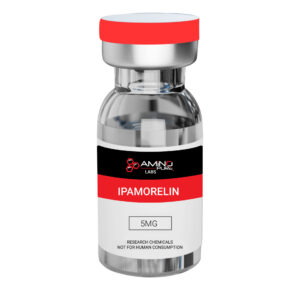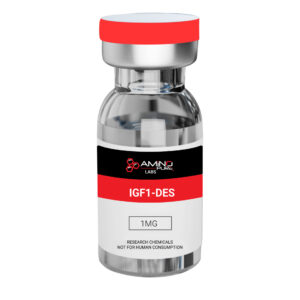DSIP 2 mg
Original price was: $43.18.$23.99Current price is: $23.99.
The delta-sleep-inducing peptide is a neuropeptide that affects a number of endocrine and physiological processes within the central nervous system. DSIP is of primary interest for its abilities to reduce oxidative stress, normalize myocardial contractility. It is also being studied as a potential target in the treatment of the major depressive disorder.
NOT FOR HUMAN CONSUMPTION
RESEARCH CHEMICAL
Available on backorder
Description
DELTA-SLEEP-INDUCING PEPTIDE (DSIP)
Delta-sleep-inducing peptide (DSIP) is a neuropeptide with amino acid sequence Trp-Ala-Gly-Gly-Asp-Ala-Ser-Gly-Glu and molecular mass 848.81 g/mol. DSIP occurs in both free and bound forms in the hypothalamus, limbic system and pituitary as well as various peripheral organs, tissues and body fluids. In the pituitary it co-localises with many peptide and non-peptide mediators such as corticotropin-like intermediate peptide (CLIP), adrenocorticotrophic hormone (ACTH), melanocyte-stimulating hormone (MSH), thyroid-stimulating hormone (TSH) and melanin concentrating hormone (MCH). Delta-sleep-inducing peptide is abundant in the gut secretory cells and in the pancreas where it co-localises with glucagon.
Delta sleep-inducing peptide (DSIP) has several physiological effects in addition to its ability to promote sleep in animals. It is also involved in neuroendocrine regulation and release of anterior pituitary hormones. In rodents and humans, Delta sleep-inducing peptide (DSIP) influence in the secretion of adrenocorticotropic hormone (ACTH), luteinizing hormone (LH) and growth hormone (GH). It also plays a role in the regulation of the circadian rhythms and and can help restore disturbed patterns of sleep.
DELTA-SLEEP-INDUCING PEPTIDE HISTORY
Delta-sleep-inducing peptide was first discovered in 1974 by the Swiss Schoenenberger-Monnier group who isolated it from the cerebral venous blood of rabbits in an induced state of sleep. It was primarily believed to be involved in sleep regulation due to its apparent ability to induce slow-wave sleep in rabbits, but studies on the subject have been contradictory.
DSIP FUNCTION, ROLES AND EFFECTS
Many roles for DSIP have been suggested following research carried out using peptide analogues with a greater molecular stability and through measuring DSIP-like immunological (DSIP-LI) response by injecting DSIP antiserum and antibodies.
DSIP Roles in endocrine regulation:
-
- DSIP decreases basal corticotropin level and blocks its release.
- DSIP stimulates release of luteinizing hormone (LH).
- DSIP stimulates release of somatoliberin and somatotrophin secretion and inhibits somatostatin secretion.
DSIP Roles in physiological processes:
-
- DSIP can act as a stress limiting factor, stress suppression.
- DSIP may have a direct or indirect effect on body temperature and alleviating hypothermia.
- DSIP may normalize blood pressure and myocardial contraction.
- DSIP enhance the efficiency of oxidative phosphorylation in rat mitochondria in vitro, suggesting it may have antioxidant effects.
- Some studies suggest a link between DSIP and slow-wave sleep (SWS) promotion and suppression of paradoxical sleep (PS). Stronger effects on sleep have been noted for the synthesized analogues of DSIP.
- DSIP may affect human lens epithelial cell function via the MAPK pathway, which is involved in cell proliferation, differentiation, motility, survival, and apoptosis.
DELTA-SLEEP-INDUCING PEPTIDE, RESEARCH AND SCIENTIFIC STUDIES
Effects of Delta sleep-inducing peptide on sleep of chronic insomniac patients: The influence of delta sleep-inducing peptide (DSIP) on sleep was studied in 16 chronic insomniac patients according to a double-blind matched-pairs parallel-groups design. Subjects slept for 5 consecutive nights in the laboratory. Night 1 was used for adaptation, night 2 for baseline measurements. In the afternoon before the 3rd, 4th and 5th night, half of the patients received intravenously 25 nmol/kg body weight DSIP, and half of the patients a glucose solution (placebo). Measures for sleep structure, objective (polysomnography) and subjective sleep quality and for subjective tiredness were assessed.
The results for objective sleep quality indicated higher sleep efficiency and shorter sleep latency with DSIP as compared to placebo. One measure of subjectively estimated tiredness decreased within the DSIP group. Data analysis suggested, however, that the statistically significant effects were weak and in part could be due to an incidental change in the placebo group. As none of the other measures, including subjective sleep quality, showed any change, it was concluded that short-term treatment of chronic insomnia with DSIP is not likely to be of major therapeutic benefit.
Sleep cycles are associated with important physiological processes and the production of essential hormones during sleep. And one of the negative effects and problems of many sleep aids and medicines is that they change the time or duration of these sleep cycles. Violation of these sleep cycles negatively affects the natural quality and efficiency of sleep. Performed scientific studies have shown that DSIP does not violate sleep cycles.
Delta-sleep-inducing peptide has been found to have anticarcinogenic properties. In a study on mice, injecting a preparation of DSIP over the mice’s lifetime decreased total spontaneous tumor incidence 2.6-fold. The same study found it to also have geroprotective (anti-aging) effects: it slowed down the age-related switching-off of oestrous function; it decreased by 22.6% the frequency of chromosome aberrations in bone marrow cells and it increased by 24.1% maximum life span in comparison with the control group.
Another study showed a direct link between between GILZ expression (homologous to DSIP) and adipogenesis which has links to obesity and metabolic syndrome. In adipose and other metabolically active tissues, the circadian oscillation of GILZ expression is subject to entrainment by external stimuli. Together, these observations suggest that GILZ is an attractive candidate for future studies evaluating the role of circadian mechanisms in adipose tissue physiology and pathology.
In studies on rats with metaphit-induced epilepsy DSIP acted as an anticonvulsant, significantly decreasing the incidence and duration of fits suggesting DSIP as a potential treatment for epilepsy.
DSIP has been found to have an analgesic effect. An analgesic or painkiller is any member of the group of drugs used to achieve analgesia, relief from pain. In studies on mice it was found to have a potent antinociceptive effect when administered intracerebroventricularly or intracisternally.
Due to its possible effects on sleep and nociception, trials have been carried out to determine whether DSIP can be used as an anaesthetic. One such study found that administration of DSIP to humans as an adjunct to isoflurane anaesthesia actually increased the heart rate and reduced the depth of anaesthesia instead of deepening it as expected.
A preparation of DSIP – Deltaran has been used to correct central nervous system function in children after antiblastomic therapy. Ten children aged 3–16 years were given a ten-day course of Deltaran and their bioelectric activity recorded. It was fou
nd that the chemotherapy-induced impairment in the bioelectrical activity of 9 out of the 10 children was reduced by administration of DSIP.
DSIP can act antagonistically on opiate receptors to significantly inhibit the development of opioid and alcohol dependence and is currently being used in clinical trials to treat withdrawal syndrome. In one such trial it was reported that in 97% of opiate-dependent and 87% of alcohol-dependent patients the symptoms were alleviated by DSIP administration.
In some studies administration of DSIP has alleviated narcolepsy and normalized disturbed sleeping patterns. (Narcolepsy is a long-term neurological disorder that involves a decreased ability to regulate sleep-wake cycles.)
Low plasma concentrations of DSIP have been found in patients with Cushing’s syndrome. In Alzheimer’s patients levels of DSIP have been found to be slightly elevated, though this is unlikely to be causal.
SCIENTIFICALLY INVESTIGATED POSSIBLE BENEFITS OF DSIP
-
- DSIP plays a role in the regulation of the circadian rhythms,
can help restore disturbed patterns of sleep - DSIP may helps to higher sleep efficiency
- DSIP positive influences on secretion of adrenocorticotropic hormone (ACTH), luteinizing hormone (LH) and growth hormone (GH)
- DSIP inhibits somatostatin secretion
- DSIP unlike many sleep aids and medicines, DSIP does not violate natural sleep cycles
- DSIP alleviates narcolepsy
- DSIP has anti-carcinogenic properties
- DSIP has geroprotective (anti-aging) effects
- DSIP has analgesic effect, helps with pain relief, reduces chronic pain
- DSIP may normalize blood pressure and myocardial contraction
- DSIP can act as a stress limiting factor
- DSIP may have antioxidant effects
- DSIP can be potential treatment for epilepsy
- DSIP can act antagonistically
- DSIP plays a role in the regulation of the circadian rhythms,
DELTA-SLEEP-INDUCING PEPTIDE POSSIBLE SIDE-EFFECTS
Safety and possible side-effects of long-term Delta-sleep-inducing peptide use haven’t been established in clinical research studies.
DELTA-SLEEP-INDUCING PEPTIDE FAQ
What is Delta-sleep-inducing peptide (DSIP)?
Delta-sleep-inducing peptide (DSIP) is a neuropeptide. DSIP occurs in both free and bound forms in the hypothalamus, limbic system and pituitary as well as various peripheral organs, tissues and body fluids.
What does Delta-sleep-inducing peptide do?
Delta-sleep-inducing peptide has several physiological effects and roles in endocrine regulation. It is also involved in release of anterior pituitary hormones, plays a role in the regulation of the circadian rhythms and helps to improve sleep efficiency.
What is Delta-sleep-inducing peptide used for?
Delta-sleep-inducing peptide (DSIP) can be used mainly to help with various sleep and insomnia disorders, while its great advantage over other sleep aids or drugs is, that it does not disrupt natural sleep cycles.
DELTA-SLEEP-INDUCING PEPTIDE DOSAGE
In the scientific studies and clinical trials performed, the optimal dose of Delta-sleep-inducing peptide (DSIP) is often reported as 250 mcg 2 hours before sleep. But some of the patients tested needed a higher dose of 300-400 mcg to show the positive effects of DSIP on their sleep.








